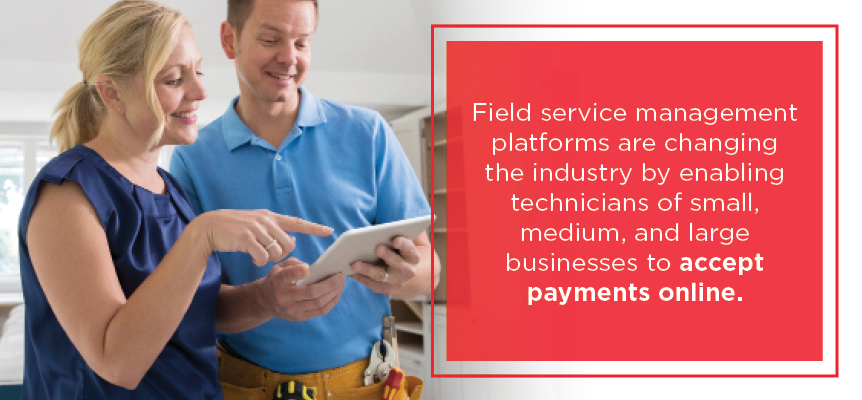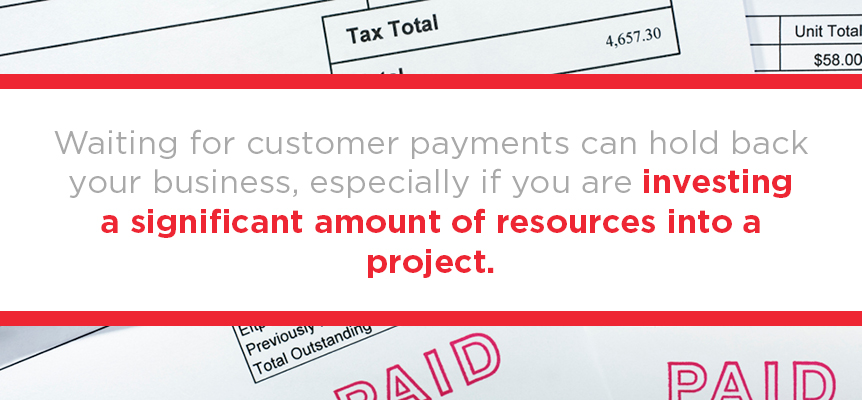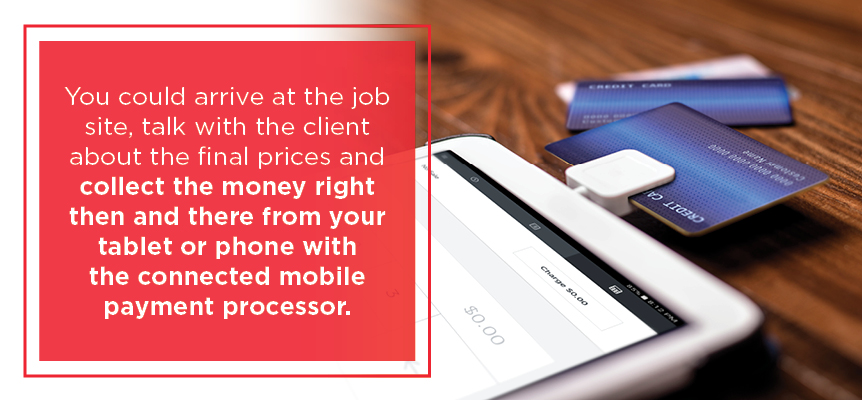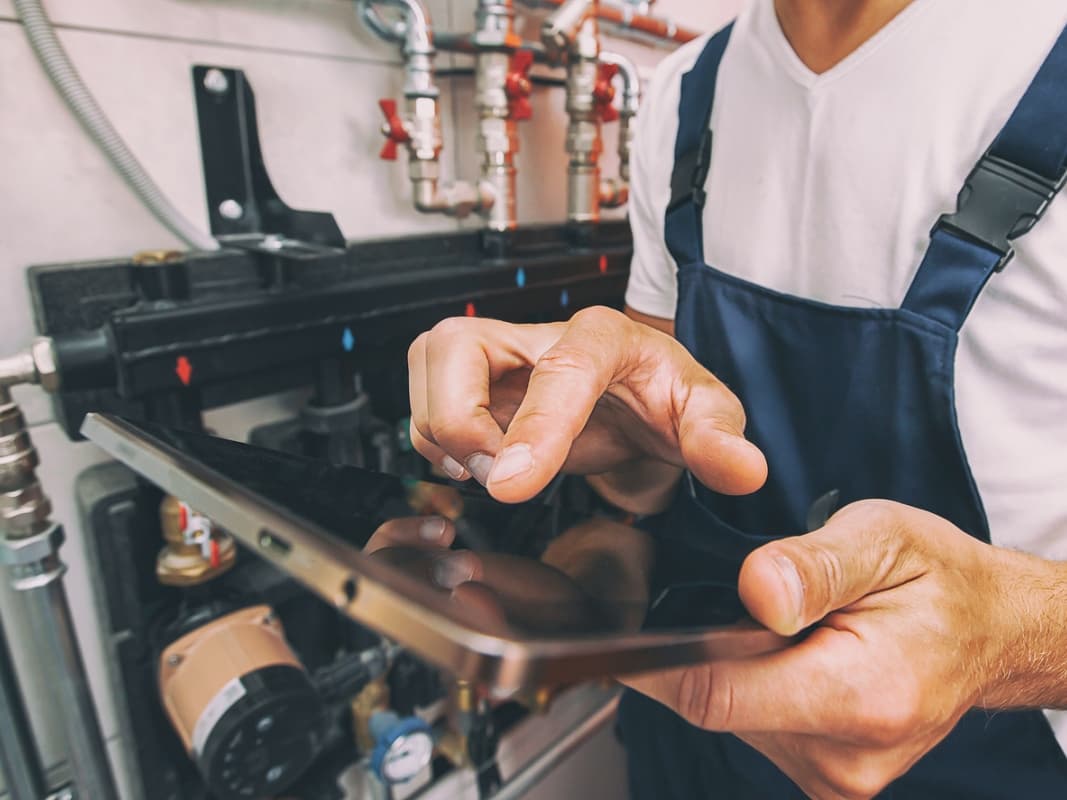
Waiting for customer payments to come in before starting your next big job? If you are a field service contractor, this problem should not be holding your business back! With mobile payment processing for field service industries, you can collect payments while working in the field instead of having to wait.
Field service management platforms are changing the industry by enabling technicians of small, medium and large businesses to accept payments onsite. Roofing, plumbing, electrical, restoration and HVAC businesses should consider adopting a mobile payment process to collect payments faster and more efficiently.
The field service industry is rapidly growing. Your business no longer has to wait to collect a payment from a customer. Just accept the payment onsite with mobile payment processing systems. If you are a business owner and tired of waiting to collect payments, consider making the change!
Card readers attached to your smartphone or tablet make mobile payment processing quick and easy! Keep your business up to date with the latest technology trends by considering a mobile payment system. Dataforma’s field management capabilities and invoice systems pair perfectly with any mobile payment system you choose. Processors such as Square, PayPal Here, Shopify, QuickBooks GoPayment and many more make it simple for you to set up mobile payment options for field techs.
Businesses ranging in size across the world are going mobile, and customers love it.
What Is Mobile Payment Processing?
People have been playing with the idea of mobile payment processing since the 1990s, but it has only recently grown into a popular, viable option for customers and merchants in the 21st century with the usage of tablets and smartphones. Mobile payments are a broad term and can mean two things.
- Mobile credit card swiping: This concept is the most common in the mobile payment industry, and most likely what your field service business will need to collect payments faster. Merchants use smartphones or tablets to accept credit cards, rather than a traditional point-of-sale register.
- Mobile peer-to-peer: Services such as PayPal, SnapCash, Square Cash, Venmo and Google Wallet allow you to send and receive money to other people free of charge. These payment methods are usually linked to a bank account. Many of these services have areas for businesses as well, so they can work in combination with mobile credit card swiping. Using a service app can require a small monthly fee for businesses.
Mobile payment processing can also mean using a smartphone or smartwatch to pay at a mobile point-of-sale system instead of swiping a card. In addition, mobile e-commerce is another concept that uses an app to make online purchases through your phone. You may be familiar with these systems from using apps such as Amazon, eBay and iTunes. For now, mobile credit card swiping is the most popular among field service contractors, with options including Square, Go Payment and PayPal.
The processing service lets you process credit and debit cards on the go and in real time out in the field. Smartphones, tablets and other technologies are evolving every day, and mobile devices are virtually ubiquitous in modern society. Businesses that work out in the environment and don’t have a solid point-of-sale system could thrive from mobile payment collections. No more waiting for invoices or writing out bills and mailing them to customers upon completed jobs. Combined with Dataforma’s Enterprise Field Service Software, your business will have top-of-the-line management and financial services.
What’s Wrong With Paper-Based Payment Methods?
Manually collecting payment methods takes time. Field technicians must write and receive the payments, which could take up to a couple of weeks or even months. Waiting for customer payments can hold back your business, especially if you are investing a significant amount of resources into a project. You want to be able to collect the money as fast as possible.

There are benefits to paper-based payment methods. Maybe your customer needs time to get the payment together before paying you, or maybe your business operates on an honor system between jobs and payment. These time-honored payment methods allow you to write out every invoice and take the time to know specifically what every detail of the job is. They also allow you to create a paper trail in case a customer defaults on a payment.
However, there’s no question problems exist with paper-based payment systems. Field service software and mobile payments can help eliminate these problems. Modern technology can help your field service business collect transactions and manage them properly. Projections show mobile payments expect to reach $808 billion in volume by 2019, and the number of people who make a mobile payment at least once a year will increase to 65 percent of the U.S. population by 2019.
Mobile payment processing can help combat the weaknesses of current payment methods. The system gives you and your field service contractors the power to decide when and where to collect payment. It also saves you time by keeping track of all your receipts in one location. The small monthly fee you have to pay for collecting for your business could essentially replace the postage fees you pay to mail invoices and the time you pay an accountant or bookkeeper to do all this work.
What Would Mobile Payment Processing Look Like for a Contractor?
For a contractor, mobile payment processing looks simple. Mobile payment technology first saw vendors in the retail space, but is now expanding into field services. What does your business look like with mobile payment technology? There are three things you should look for when adopting mobile payment processing:
- Ability to use a card reader — Card readers are the devices that come with your payment service. After inserting the device into the tablet or phone’s auxiliary or charging port, you can swipe the customer’s card with that device. From there, the app will open automatically, and you can begin filling out customer information and the amount of payment.
- Emailing capabilities to send customer receipts — There should also be an option to input the customer’s email. This step will give the customer the same point-of-sale transaction you will be receiving to ensure transparency between both parties.
- Signature capturing — Signature capturing is the best way to validate the correct person is signing for using the card. Customers can sign directly on the tablet or phone with their finger, and the app will copy their signature to the receipt.
These three features in a mobile payment processor are essentially standard, but critical to have.
Businesses that are interested in seeing what the process looks like should imagine being able to meet with clients onsite and collect payment in person directly from the client. No more waiting! You or whoever is in charge of the project could arrive at the job site, talk with the client about the final prices and collect the money right then and there from your tablet or phone with the connected mobile payment processor.

What if you lose the tablet or phone? Security with customer-sensitive information can be a priority for your field service business. It’s important to note that the card reader device and its associated app do not store card details. Instead, they back up client data in the cloud, and you can usually remove information easily if a device were to go missing. Of course, it is not completely invulnerable, but no payment method is. Mobile payments are no less secure than other payment methods.
What do you need to accept mobile payments? If you are considering adopting a mobile payment service for your business, you don’t need to overhaul your original payment methods. Just integrate it into your existing one. The only startup costs would be purchasing the card reader, a tablet or smartphone and whatever software package you may want. For Square, a favored mobile payment processor, the card reader for field service can cost up to $50, and software varies on the services you would like to include.
A field service business owner who is considering moving away from paper forms, invoices and mailing bills should consider mobile payment capabilities. Mobile payment technology helps streamline your business process and cash flow. It makes your collection duties simple, efficient and effective. Customers can easily benefit from this by paying now and not having to worry about when the bill for a certain project is coming. Contractors can expect to see a quicker timeline in between projects and less time filling out forms.
How Does Mobile Payment Processing Benefit the Customer?
Accepting payments in the field via tablet or mobile device helps improve the customer experience. Meeting with the customer before or after the job is complete gives the contractor that one-on-one time with the client. Many times, you talk about the job on the phone and then mail them the invoice. Mobile payment processing gives you some time to go over what the client is paying for while they pay for it in the field.
The customer also benefits from knowing his or her data is easy to find. Mobile payment processing keeps track of the payment records, which are easy to sort and search. If a customer calls and has a question about their project or how much they paid, you and your staff can quickly find their data and answer their questions.
In the modern era, customers expect to be able to pay by card. Field service operations generally require manually inputting credit card information over the phone back at the office or when you are calling to collect the invoice. Mobile payment processing eliminates this wasted time. Just insert the customer’s debit or credit card into the reader, and it processes the payment in minutes. Online payments are the most beneficial option for both you as a service provider and your customers. You will be able to close more sales because of the quick processing time and ability to accept all payment methods.

A simple, straightforward payment process leads to happier and more loyal customers who will be more inclined to recommend your field services to other people in the area.
How Does Mobile Payment Processing Benefit the Contractor?
Of all the benefits of using mobile payment systems when working in the field, perhaps the most significant is that it speeds up the collection timeline. Instead of returning to the office to review completed jobs, put together a series of invoices, then mail or email them to the customers who may or may not pay right away, contractors can ask for payment as soon as they complete the job, and keep digital records of job completion history.
Field service businesses generally rely heavily on cash flow and revenue. Mobile payments help speed up the gap between service completion and payment, thus allowing you to accept more jobs in the future. Check out the Payment Time Lag for Various Mobile chart to see how much time you and your field service technicians could be saving in the payment process.
You can close more sales with mobile payment processing. Receiving payment quickly for jobs allows for more future planning and starting new jobs. In summary, it helps ensure you get paid and speeds up payments from customers.
Mobile payment processing can help automate record-keeping in your system. If you have an accountant, he or she can easily keep track of all transactions through the mobile payment platform. Many mobile invoicing apps integrate with accounting software, but it is good to ask if the one you are considering does.
Pick a Service Provider You Can Trust for Mobile Payments
Businesses in the field service industry, such as roofing, plumbing, electrical, restoration and HVAC, should consider adding a mobile payment processing system to complement not only their current financial collection process, but also their overall business management software. If you currently do have mobile payment processing or would like to start by adding field service management software to your business, consult with Dataforma for a free demo!
Mobile payment processing is growing in popularity with easy to work with and operate vendors such as Square, PayPal Here and Shopify. Check out the best mobile credit card processing services and their fees to learn more! Contractors in the field can see many benefits to their operations by adding this type of system.

Mobile payment processing allows your business to collect payments faster, build greater customer loyalty and save time. Best of all, it guarantees you will get paid after completing a project. Take your entire business processes mobile — from field business management capabilities with Dataforma to payment processing with providers like Square! Your business will be ready to grow to the next level.
To find out how Dataforma can fit into your business and help you reach new heights, send us your details to request a free demonstration with our team.










